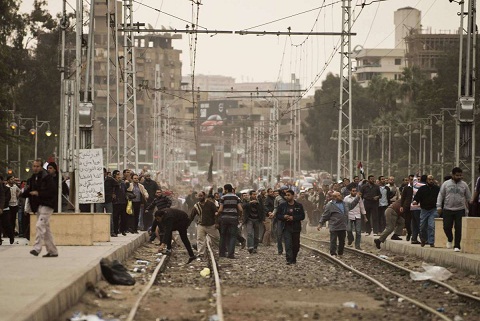CAIRO: Human rights activists criticized Thursday the foreign ministry’s rejection of a recent report on human trafficking published by the US Department of State.
“We may understand that that government lies but at least it should know how to lie,” Arabic Network for Human Rights Information (ANHRI) Director Gamal Eid told Daily News Egypt.
“Refusing to admit the existence of such violations means there is no intention to correct them,” he added.
The 10th annual Trafficking in Persons Report, released Monday, described Egypt as a source, transit, and destination country for women and children who are subjected to trafficking in persons, specifically forced labor and forced prostitution.
In response, the foreign ministry released a strongly-worded statement Wednesday.
“Egypt does not acknowledge the methodology of such reports and disagrees with the fundamentals they were based on,” official ministry spokesman Hossam Zaki said.
“Egypt rejects the … undocumented allegations of non-governmental organizations [referred to in the report] … that official investigations proved to be [untrue],” Zaki added.
“The ministry reacted the same way as it did before to other reports … [casting doubt on] its credibility,” Magda Botrous, researcher at Egyptian Initiative for Personal Rights, told Daily News Egypt.
Some of Egypt’s estimated 200,000 -1,000,000 million street children — both boys and girls — are exploited in prostitution and forced begging, the report noted.
Local gangs are, at times, involved in this exploitation, the report noted.
Egyptian children are recruited for domestic and agricultural labor; some of them face conditions indicative of involuntary servitude such as restrictions on movement, non-payment of wages, threats and physical or sexual abuse, the report said.
In addition, wealthy men from the Gulf reportedly travel to Egypt to purchase “temporary” or “summer marriages” with Egyptian females, including girls who are under the age of 18.
The report pointed out that Egypt is a transit country for women trafficked from Uzbekistan, Moldova, Ukraine, Russia, and other Eastern European countries to Israel for commercial sexual exploitation. Organized crime groups are involved in these movements.
The report also referred to some positive measures taken by the government.
According to the report, the government does not fully comply with the minimum standards for the elimination of trafficking. But it is making significant efforts to do so, passing a new legislation that criminalizes trafficking in persons for labor and sexual exploitation, the report said.
“I think the ministry could have reacted in a different way. The report in fact mentioned a number of positive aspects … [praising] the new bill and … recommending steps for implementation,” Botrous noted.
On May 2, the People’s Assembly (PA) passed an anti-trafficking law in a bid to combat what the United Nations had earlier described as a rising phenomenon in Egypt.
Based on the law, a victim is not to be questioned for any compulsorily crimes committed.
“The new law represents an important step in eliminating severe forms of trafficking in persons, though its implementation is as yet untested,” the report argued.
“Enacting such a law implies recognition of the existence of such crimes in Egypt,” Eid said.
In the third week of May, a 66-year old Saudi Arabian national was sentenced to 10 years in prison in absentia for marrying a 14-year old Egyptian girl. The marriage broker who facilitated the marriage received a similar sentence.
The court sentenced the lawyer who forged the common law (urfi) marriage contract to two years in prison, while the minor’s parents were handed down a one-year suspended sentence.

